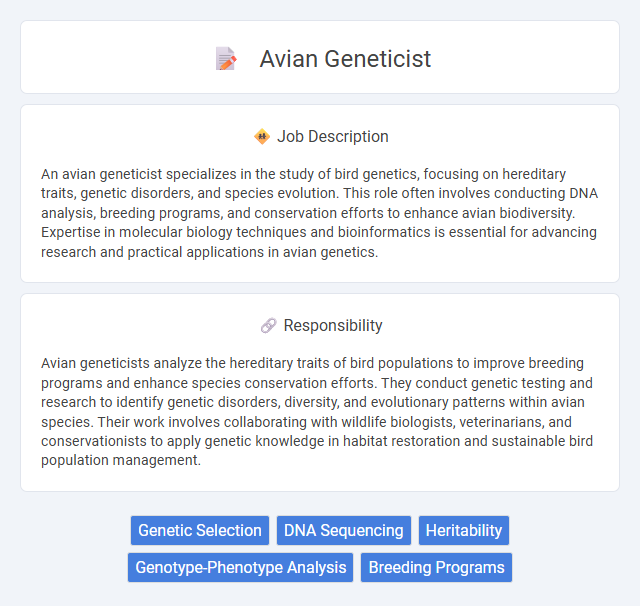
An avian geneticist specializes in the study of bird genetics, focusing on hereditary traits, genetic disorders, and species evolution. This role often involves conducting DNA analysis, breeding programs, and conservation efforts to enhance avian biodiversity. Expertise in molecular biology techniques and bioinformatics is essential for advancing research and practical applications in avian genetics.
Individuals with a strong passion for biology and genetics are likely well-suited for a career as an avian geneticist, especially those who enjoy research and working with animals. Candidates who are detail-oriented, patient, and capable of handling complex data may find this profession satisfying and rewarding. Those who prefer hands-on fieldwork combined with laboratory analysis could probably thrive in this role, while people less comfortable with scientific rigor might struggle to excel.
Qualification
Avian Geneticists require a strong background in genetics, molecular biology, and ornithology, typically holding a master's or doctoral degree in genetics, biology, or a related field. Proficiency in DNA sequencing, genomic analysis, and bioinformatics tools is essential for analyzing avian genetic data. Experience with breeding programs, conservation genetics, and laboratory techniques enhances their ability to study hereditary traits and improve bird populations.
Responsibility
Avian geneticists analyze the hereditary traits of bird populations to improve breeding programs and enhance species conservation efforts. They conduct genetic testing and research to identify genetic disorders, diversity, and evolutionary patterns within avian species. Their work involves collaborating with wildlife biologists, veterinarians, and conservationists to apply genetic knowledge in habitat restoration and sustainable bird population management.
Benefit
Avian geneticist positions likely offer benefits such as contributing to the improvement of bird populations through advanced genetic research, which may enhance biodiversity and disease resistance. There is probable potential for collaboration with agricultural and environmental organizations, leading to impactful conservation efforts. Employees in this field might expect access to cutting-edge laboratory technology and opportunities for professional growth within specialized genetics and ecology sectors.
Challenge
Avian geneticists likely face complex challenges in decoding the genetic makeup of diverse bird species due to their vast genetic variability and evolutionary adaptations. The probability of encountering difficulties in developing precise gene-editing techniques for avian species is high, given the uniqueness of their reproductive biology. Navigating ethical considerations and regulatory constraints may further complicate research efforts in avian genetics.
Career Advancement
An Avian Geneticist career advances through specialization in genomics, bioinformatics, and evolutionary biology, leading to roles such as senior researcher or laboratory director. Progression often involves publishing in scientific journals, securing research grants, and contributing to breeding programs for genetic improvement in poultry or wild bird populations. Expertise in CRISPR technology and data analysis strengthens opportunities for leadership positions within academia, biotechnology firms, or conservation organizations.
Key Terms
Genetic Selection
Avian geneticists specialize in genetic selection to enhance desirable traits such as disease resistance, growth rate, and reproduction efficiency in poultry populations. They utilize advanced genomic tools, including DNA sequencing and marker-assisted selection, to identify and propagate optimal gene variants. This targeted breeding approach accelerates productivity improvements and supports sustainable poultry farming practices.
DNA Sequencing
Avian geneticists specializing in DNA sequencing analyze the genetic material of bird species to understand their evolutionary relationships, identify genetic disorders, and support conservation efforts. Utilizing advanced sequencing technologies such as next-generation sequencing (NGS), they decode avian genomes to pinpoint genetic variations and markers essential for breeding programs and disease resistance. Their work contributes to biodiversity preservation and enhances knowledge in fields such as ecology, evolutionary biology, and biotechnology.
Heritability
Avian geneticists analyze heritability to determine the genetic basis of traits in bird populations, using quantitative genetics to estimate the proportion of phenotypic variance attributable to genetic factors. Heritability estimates guide selective breeding programs aimed at enhancing desirable characteristics such as disease resistance, growth rate, and plumage quality. Advanced genomic tools enable precise identification of heritable markers, optimizing genetic improvement strategies in avian species.
Genotype-Phenotype Analysis
Avian geneticists specializing in genotype-phenotype analysis investigate the genetic basis of physical and behavioral traits in bird species, using advanced genomic sequencing and bioinformatics tools. They analyze DNA variations to understand hereditary patterns, enabling precise identification of gene functions related to feather coloration, song patterns, and disease resistance. This expertise supports breeding programs, conservation efforts, and the study of evolutionary mechanisms within avian populations.
Breeding Programs
Avian geneticists specialize in developing and managing breeding programs to enhance desirable traits such as disease resistance, growth rates, and plumage quality in bird populations. They utilize genetic analysis tools and selective breeding techniques to optimize genetic diversity and improve overall flock performance. Their work supports sustainable poultry production, conservation efforts, and commercial aviculture industries.
 kuljobs.com
kuljobs.com